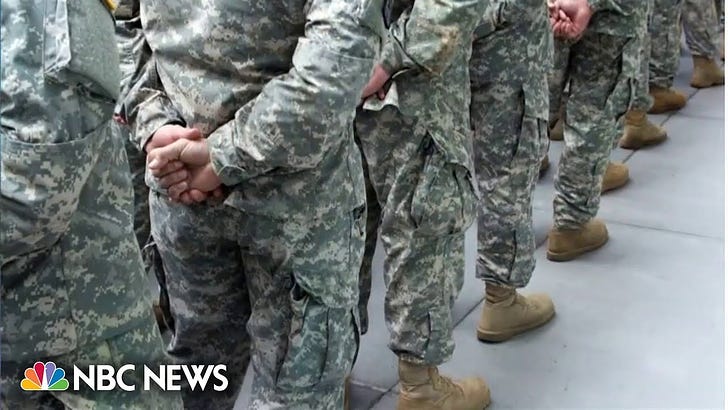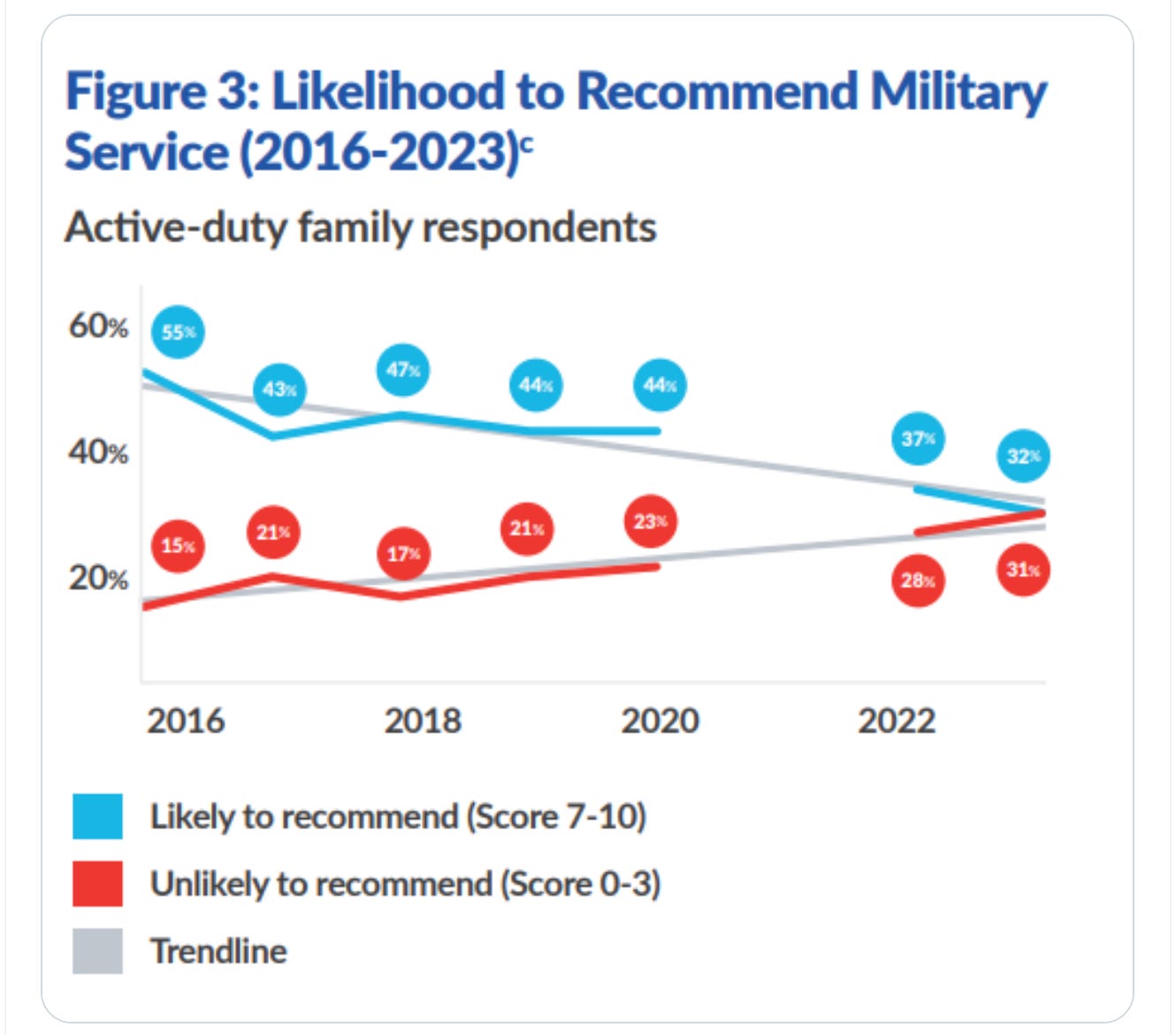Crossroads -- Asking faith questions about future U.S. soldiers
Are Bible Belt families and pastors still enthusiastic about sending children into the armed services?
Try to imagine an America in which families that have, for generations, urged their children to serve in the armed services stopped doing precisely that.
Would that be a big news story?
One would think so. With that in mind, take a look at the numbers in this chart posted on X by the Missing Data Depot Substack feed.
Here’s the written summary from that tweet:
Military families have soured on the military. The % of military family members who would recommend service to their children dropped from 55% in 2016 to 32% in 2023.
Relatedly the military fell 41,000 recruits short of its 2023 goal & it is now at its smallest size since 1940.
Clearly, economic issues — think slow-rising salaries, housing costs for military families, day-care costs and more — are affecting recruiting. You can read all about that in this report by Stars and Stripes. These are logical, valid angles for reporting.
However, during this week’s “Crossroads” podcast, we focused on some of the cultural, moral and, yes, religious themes that almost certainly loom over these military recruiting woes. Are journalists asking “religion ghost” questions?
Yes, many conservative American have voiced concerns about “woke” military policies that are frequently linked to DEI (diversity, equity and inclusion) debates, as well as LGBTQ+ issues. At the same time, it helps to ask practical questions about what kinds of families have traditionally produced American soldiers. Pay close attention to the following, drawn from a 2023 Wall Street Journal report (hat tip to Rod Dreher’s “Military Families Losing Faith” Substack post):
The children of military families make up the majority of new recruits in the U.S. military. That pipeline is now under threat. …
“Influencers are not telling them to go into the military,” said Adm. Mike Mullen, the former chairman of the Joint Chiefs of Staff, in an interview. “Moms and dads, uncles, coaches and pastors don’t see it as a good choice.”
The big “Crossroads” question: Do many of these families come from specific pews and zip codes?
The WSJ report notes that, with the end of the draft, the leaders of America’s armed services built programs that relied heavily on “military families to develop the next generation of recruits, especially in the region known in the military as the ‘Southern Smile,’ a curving region from the mid-Atlantic and down across the southern U.S.” Also, don’t forget that: “Today, nearly 80% of all new Army recruits have a family member who has served in uniform, according to the service.”
Thus, here is a question about the religion data in that equation: Can Episcopal and liberal mainline Protestant churches in the Northeast produce as many future soldiers as Baptists, Pentecostals and nondenominational evangelicals in the Bible Belt?
Enjoy the podcast and, please, pass it along to others.






Just retired after 20 years in uniform. 4 kids, none went military.
Yes, the revolution in morals in the military plays a part in my no-vote for people to sign up. When I entered the service, don't ask-don't tell was the rule for homosexual soldiers. Now the military will pay for your gender reassignment.
But that's not the full story. 20 years ago we were waging "war on terror." How did that turn out? We had an inglorious evacuation of Afghanistan after our longest time engaged ever. Translation, we failed. Iraq really didn't turn out any better. Who's going to recommend signing up for that? Spend your prime years sacrificing for nothing, while watching friends die, marriages fail, and other friends get messed up physically and/or mentally. All for no net gain as a country.
Nope. Is it all the military's fault? No, I place a lot of blame on the State Department for being completely inept and understanding how to "nation build."
I'm glad I'm out. I'm glad I survived to retire.
My active duty was 1963-67. The only non-white officers I encountered were a very few Asian-Americans. There were no women officers at sea, most were nurses. A friend who had been commissioned with me and in whom the Navy had invested many thousands of dollars in an NROTC scholarship was exposed as a homosexual and administratively discharged, even though there was no evidence or even allegation that he had had sex with anyone in the Navy. A good officer who was no threat to anyone was released, a waste of taxpayer money.
Now, there are many more non-white and gay naval officers, and the sailors in the fleet accept them as equals, a much better state of affairs than 60 years ago. Recruiting is down not because of DEI, but because the recent wars have been started on false or flimsy premises (For what good cause did my shipmates die in Vietnam?) and because the tempo of operations and deployments are grueling. Suicides rates among the military are above that of the general population; there's too much unnecessary stress and too many unrealistic demands. Having a former president who vocally belittles and insults those who have served, fought, and died hardly encourages recruitment.
Actively seeking to include everyone in the military ensures the participation in national defense by all Americans. The Chairman of the Joint Chiefs of Staff is a Black man; the Chief of Naval Operations and the Commandant of the Coast Guard are White women. They got there through achievement, dedication.
When my wife was in medical school 55 years ago, there was still vocal opposition to women in many specialties and even to being medical doctors at all. We have come a long way. Raising the DEI/woke boogieman seems to be a negative, visceral reaction that exposes bigotry and fear.
Anchor's aweigh.
Earl Higgins
Commander, U.S. Navy (Retired)